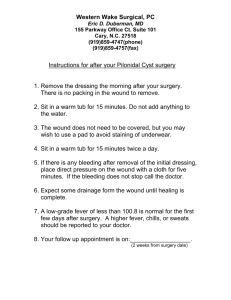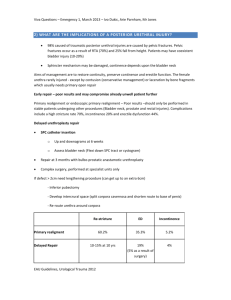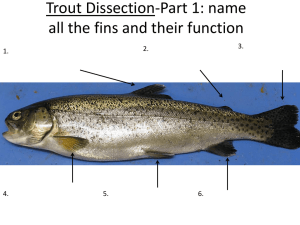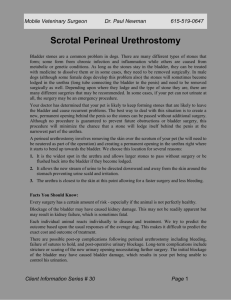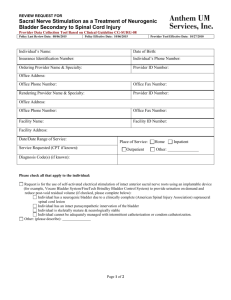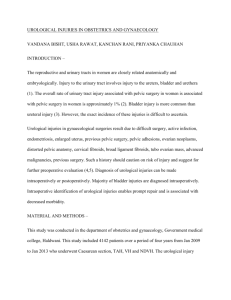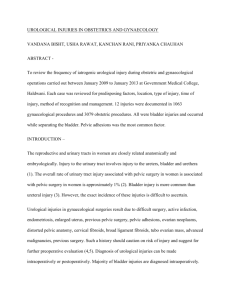Post-op Instruction - Intermountain Healthcare
advertisement
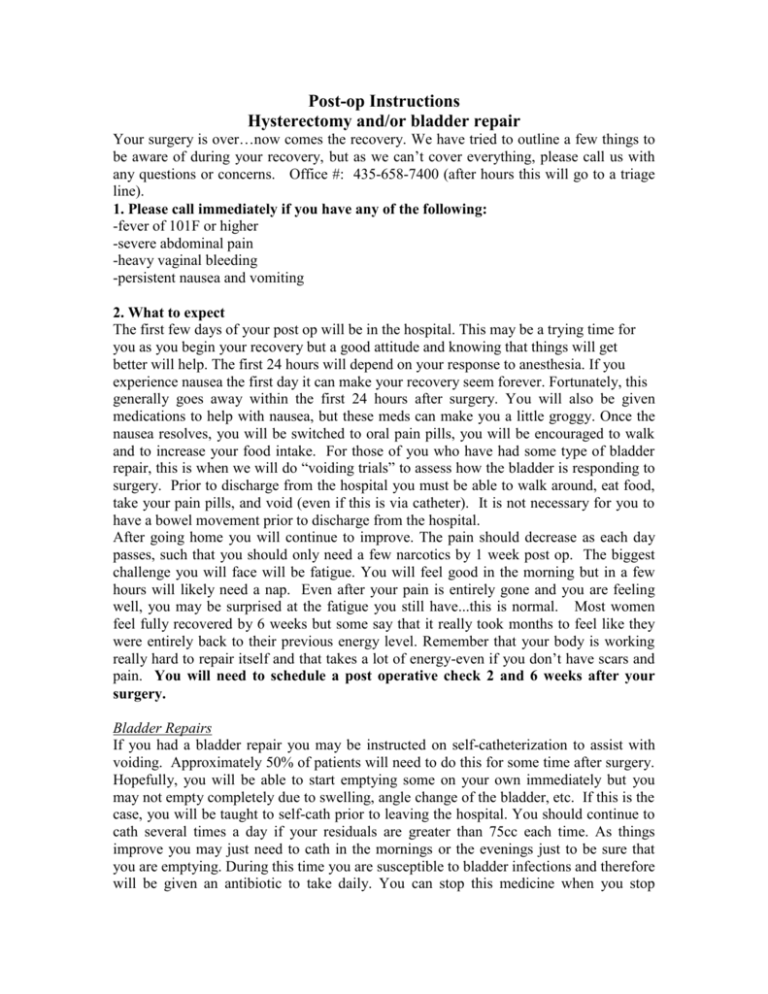
Post-op Instructions Hysterectomy and/or bladder repair Your surgery is over…now comes the recovery. We have tried to outline a few things to be aware of during your recovery, but as we can’t cover everything, please call us with any questions or concerns. Office #: 435-658-7400 (after hours this will go to a triage line). 1. Please call immediately if you have any of the following: -fever of 101F or higher -severe abdominal pain -heavy vaginal bleeding -persistent nausea and vomiting 2. What to expect The first few days of your post op will be in the hospital. This may be a trying time for you as you begin your recovery but a good attitude and knowing that things will get better will help. The first 24 hours will depend on your response to anesthesia. If you experience nausea the first day it can make your recovery seem forever. Fortunately, this generally goes away within the first 24 hours after surgery. You will also be given medications to help with nausea, but these meds can make you a little groggy. Once the nausea resolves, you will be switched to oral pain pills, you will be encouraged to walk and to increase your food intake. For those of you who have had some type of bladder repair, this is when we will do “voiding trials” to assess how the bladder is responding to surgery. Prior to discharge from the hospital you must be able to walk around, eat food, take your pain pills, and void (even if this is via catheter). It is not necessary for you to have a bowel movement prior to discharge from the hospital. After going home you will continue to improve. The pain should decrease as each day passes, such that you should only need a few narcotics by 1 week post op. The biggest challenge you will face will be fatigue. You will feel good in the morning but in a few hours will likely need a nap. Even after your pain is entirely gone and you are feeling well, you may be surprised at the fatigue you still have...this is normal. Most women feel fully recovered by 6 weeks but some say that it really took months to feel like they were entirely back to their previous energy level. Remember that your body is working really hard to repair itself and that takes a lot of energy-even if you don’t have scars and pain. You will need to schedule a post operative check 2 and 6 weeks after your surgery. Bladder Repairs If you had a bladder repair you may be instructed on self-catheterization to assist with voiding. Approximately 50% of patients will need to do this for some time after surgery. Hopefully, you will be able to start emptying some on your own immediately but you may not empty completely due to swelling, angle change of the bladder, etc. If this is the case, you will be taught to self-cath prior to leaving the hospital. You should continue to cath several times a day if your residuals are greater than 75cc each time. As things improve you may just need to cath in the mornings or the evenings just to be sure that you are emptying. During this time you are susceptible to bladder infections and therefore will be given an antibiotic to take daily. You can stop this medicine when you stop catheterizing. Your bladder will also be very irritated and it is common to notice some extreme urge and possibly some incontinence. You may feel the sudden urge have to go to the bathroom and may then leak before you have a chance to get to the restroom. You may feel like you have to go to the bathroom and then have pain as you bladder contracts. Be assured that this will improve as your bladder heals. If severe we can try a medication on a short term basis to keep your bladder from having spasms while it heals. 3. Activity and diet For the first few days you probably won’t feel up to doing much. As you feel better you can start walking, shopping, cooking etc. based upon how you feel. The only caution would be heavy lifting. You should NOT lift anything heavier that you can do easily with two hands (approx 10 lbs) for the first two weeks, then less than 20 lbs until your 6 week visit. At that point you will be evaluated for further lifting. If you had a bladder repair you should ALWAYS be cautious of lifting. Intercourse should be avoided until your 6 week check unless told otherwise. Swimming and aerobic exercise will depend on the surgery you had but in general you should be able to restart in 4-6 weeks post op. If you are healing very well at your 2 week check you may be cleared to begin exercising sooner. Eating a well balanced diet will help in your healing. Drink plenty of water as well. It may take you few days to have your first bowel movement. Constipation is very common after surgery, and eating fiber, drinking prune juice or taking stool softeners may be helpful. 4. Pain control In the hospital you will be treated with IV and oral pain medications. Please use what you need. It has been shown that you use more narcotics by trying to “catch up” on pain than if you stay on top of it through the day. If you notice that your nausea is worse after pain meds let us know so we can try a different one. You should receive a prescription for pain meds before going home. Using Ibuprofen (Advil) 800mg every 6 hours may also be useful. Be cautious when taking Tylenol since many narcotic pain meds (like Lortab) contain acetaminophen (the ingredient in Tylenol), and too much can be very toxic. If your pain is not in control, or if it is worsening, please let us know. 5. Bleeding You will likely have some spotting here and there with activity. All bleeding is coming from the vaginal cuff as you don’t have a uterus anymore. You should expect as much bleeding as you would from any other incision on your body. You may notice some watery discharge as well that may appear blood-tinged – this is generally drainage from the pelvis after we irrigate with saline during the surgery. If your ovaries were left, you will still cycle but without any bleeding. Therefore you may have PMS, bloating, ovulation pain, etc. Occasionally, the ovaries act “stunned” such that you might experience some menopausal symptoms like hot flashes for a few weeks until the ovaries start working again. 6. Wound care If you’ve had vaginal surgery your sutures will dissolve on their own. If you’ve had abdominal surgery you will have a wound with staples. These will most likely be removed in the hospital or a few days after you are discharged. You will then have steristrips placed. It is fine to get these wet. They may fall off by themselves which is fine, but if they haven’t fallen off in 10-14 days you can remove them. Please call if you have any redness or drainage around your wound. It is common to have a little swelling or lump under your wound, or numbness along the edges of the incision. Please remember that there is always someone available to answer your questions. We hope that this is a good experience for you. Please let us know if there is anything we can do to make it better.

